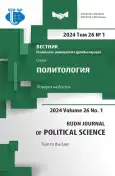Russia, China, and North Korea Strategic Defense Partnership
- Авторлар: Naumenko A.S.1, Saltanov S.D.2
-
Мекемелер:
- RUDN University
- Far Eastern Federal University
- Шығарылым: Том 26, № 1 (2024): Turn to the East
- Беттер: 107-120
- Бөлім: REGIONAL SECURITY AND GEOPOLITICS ISSUES
- URL: https://journal-vniispk.ru/2313-1438/article/view/322449
- DOI: https://doi.org/10.22363/2313-1438-2024-26-1-107-120
- EDN: https://elibrary.ru/OBKQAW
- ID: 322449
Дәйексөз келтіру
Толық мәтін
Аннотация
Due to the aggravation of the global geopolitical confrontation, the relations in the sphere of security issues within the framework of the Russia - China - North Korea triangle get particular importance. The purpose of the study is to analyze the current state and prospects of the strategic defense partnership between Russia, China, and North Korea. The authors used the following methods: a system approach, a method of situational analysis, a comparative method, a method of analyzing the current situation, as well as a method of scenario forecasting. The authors analyzed the relations between Russia and China in the military sphere, Russian-North Korean relations in the security sphere, as well as the role of China and North Korea in ensuring stability in the region. It is concluded that in the current conditions of rising tensions in the AsiaPacific region, primarily on the island of Taiwan and the Korean peninsula, these countries will converge, first, against the triangle USA - Japan - South Korea, often called “Asian NATO”. To conclude, the relations between Russia, China and North Korea will not take the form of a fullfledged military alliance. It is expected that the efforts of military-technical cooperation and the possibility of mutual support in the event of a security threat to one of the countries will be deepened.
Негізгі сөздер
Авторлар туралы
Alina Naumenko
RUDN University
Email: naumenko-as@rudn.ru
ORCID iD: 0000-0003-4461-4728
SPIN-код: 3270-2202
PhD Student, Assistant Professor in the Department of Comparative Politics, Faculty of Humanities and Social Sciences
Moscow, Russian FederationStanislav Saltanov
Far Eastern Federal University
Хат алмасуға жауапты Автор.
Email: saltanov.sd@dvfu.ru
SPIN-код: 3124-0028
PhD student of the Department of International Relations of the School of Regional and International Studies (Oriental Institute)
Vladivostok, Russian FederationӘдебиет тізімі
- Buzan, B., & Waever, O. (2003). Regions and Powers. The Structure of International Security. Cambridge University Press.
- Karaganov, S.A. (2018). How to win the Cold War? Notes on the past and future. Russia in global politics, 5. Retrieved October 9, 2023, from https://globalaffairs.ru/articles/kak-pobedit-vholodnoj-vojne-2/ (In Russian).
- Kireeva, A.A. (2022). Theories of international relations and prospects of a military alliance between Russia and China. Russian Journal of World Politics and Law of Nations, 1(1–2), 98–130. https://doi.org/10.24833/RJWPLN-2022-1-2-98-130
- Korolev, A.N. (2019). How Close Are Russia and China? Assessing Military-Strategic Cooperation in International Relations. Russia and the Pacific, 3, 138–160. http://doi.org/10.24411/10268804-2019-10043 (In Russian).
- Korolev, A.N. (2021). Balances of power, threat, and interests: The logic behind China-Russia strategic alignment in the post-Cold War period. Moscow University Bulletin of World Politics, 3, 75–111. (In Russian). http://doi.org/10.48015/2076-7404-2021-13-3-75-111
- Lagutina, M.L., & Lapenko, M.V. (2023). Turn to the East in the context of Russia’s foreign policy: The past and the present. Oriental Vector: History, Society, State, 1, 23–37. (In Russian). http://doi.org/10.18101/2949-1657-2023-1-23-37
- Lantsov, S.A., & Usmonov, F.I. (2008). Security problems in the theory of international relations: comparative analysis of the main directions. Political expertise: POLITEX, 4(2), 151–163. (In Russian).
- Lukin, A.V. (2018). China and Russia. The New Rapprochement. Cambridge: Polity Press.
- Naumenko, A.S. (2020). Features of the development of modern Russian-Chinese relations. Russian political science, 4(17), 106–110. (In Russian).
- Saltanov, S.D. (2022). Interaction of the DPRK with the regions of the Russian Far East at the present stage. Bulletin of the Amur State University. Series: Humanities, 98, 12–17. (In Russian). http://doi.org/10.22250/20730268_2022_96_12
- Walt, S. (1987a). Alliance formation and the balance of world power. International Security, 9(4), 3–43.
- Walt, S. (1987b). The Origins of Alliances. Ithaca: Cornell University Press.
- Ward, M.D. (1982). Research gaps in alliance dynamics. Denver: University of Denver.
Қосымша файлдар









